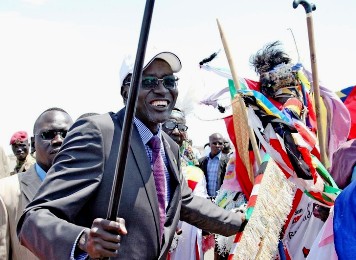South Sudan resumes oil flow via Sudan after “temporary blockage”
May 22, 2013 (JUBA) – South Sudan’s oil minister said late on Wednesday that it had resumed oil production and flow to the international markets through the territory of neigbouring Sudan after a temporary blockage at Jebellen.

The minister assured commitment of his government to fully implement the cooperation agreement which Juba signed with the government of Sudan in September 2012.
Early this week Juba accused Khartoum of instructing oil companies to stop production from some oil fields, although this has been denied by the Sudanese government, who have described fall in oil flow as a technical issue.
South Sudan’s foreign minister, Nhial Deng Nhial, said Wednesday that the government had “received information that these technical problems apparently are being addressed and the pumping station number two apparently is going to open sometime in the course of today.”
Minister Dhieu told Sudan Tribune on Wednesday from Sudanese capital Khartoum that the implementation of cooperation agreement “will build trust and confidence between the countries. The implementation of oil agreement will be a catalyst to the other agreements.”
Dhieu said he was invited to Khartoum by his Sudanese counterpart Awad Ahmed Al-jaz for a discussion on the way the two ministers could work together to ensure that a similar incident is avoided from occurring in the future.
In Juba, South Sudanese Minister of information and broadcasting service Barnaba Marial Benjamin said the oil will resume at its previous capacity of 200 barrels per day.
“The oil will flow again this afternoon today. There was a temporary blockage at station number two (2) at Jebellen and it has been resolved”, Marial told reporters after a cabinet meeting on Wednesday.
He said the visit of the minister to Khartoum will clear the air and resumption of normal operation of the oil workers in the area but also did not give a reason for the blockage.
Wednesday’s cabinet meeting, chaired by president Salva Kiir Mayardit, was dedicated to the oil shutdown, with the minister of petroleum and mining submitting a report on the visit of the technical committee which was dispatched to the site on Monday.
KIIR’S SHUTDOWN WARNING
President Salva Kiir had warned on Monday that South Sudan could once again be forced to shut down the flow of oil to the international markets through Sudanese territory.
President Kiir made the remark at a police graduation ceremony in Juba on Monday during which he called on the public to continue tightening their belts and help his government to address post-secession disputes with the government of neigbouring Sudan with which they have been unable to settle sticking issues.
“There could be oil shutdown again if [the Sudanese government] continue to use playing tactics and denials. We are still working with them [Sudan] in a diplomatic way. We want to see that they are the ones who have started it so that we are not blamed again by their friends”, Kiir Monday.
Kiir’s comments are presumed to have prompted the ministry of foreign affairs and international cooperation to summon the Chinese and Sudanese ambassadors over issue.
Officials at the country’s petroleum and mining ministry say the stoppage began on Saturday when security operatives “tied nuts” and chased away oil workers from the Tharjath oil field in Unity state.
The White Nile Petroleum Operating Company, which runs the oil field has declined to make a comment.
The Sudanese ambassador to Juba, Mutrif Sadiq, said his government did not authorise the closure but said there may have been a misunderstanding which he thinks was not brought to the attention of the leadership.
Sadiq said he has been in contact with Khartoum over the issue and they were making necessary efforts to find out what actually happened; adding that he hopes it will be resolved soon.
The Sudanese diplomat made the remark after he was summoned by the South Sudanese ministry of foreign affairs and international cooperation on Tuesday after Chinese ambassador pledged his country would make some contacts with Sudan to issue is addressed promptly.
Oil production resumed last month after Juba stopped exports through Sudan in January 2012 due a transit fee dispute.
REACTIONS TO THE FEARS OF OIL CLOSURE
South Sudanese minister of information, Barnaba Marial Benjamin, on Monday told Sudan Tribune he was not aware of the closure but later accepted there was “a technical matter” which the government was investigating.
The undersecretary at the ministry of petroleum and mining, Machar Aciek Ader, declined to give any comment when by Sudan Tribune contacted him on Monday and Tuesday.
Ader was one of the senior government officials dispatched to the site to investigate the incident.
Officials at the ministry claimed he had forwarded the report to the minister confirming initial reports indicating that the flow of oil had been restricted by Sudanese security operatives who had interfered in the technical activities of the oil workers.
A senior government official at the ministry parliamentary affairs told Sudan Tribune on Wednesday that South Sudan’s 2011 independence was incomplete if it continues to rely on Sudan for oil exports.
“I never felt in life that Sudan would not one day honour any agreement to our satisfaction. There are numerous examples I can cite. The most recent example is the implementation matrix. Our forces withdrew but what did they do, they refused and the international community is quiet”, he said, referring to the September cooperation agreement in which both sides agreed to pull their troops back from the tense and disputed border.
The official who did not want to be identified said the government abandon the idea of relying on the Sudanese pipeline and concentrate efforts in the construction of the alternative pipeline to the East Africa coast.
Jok Dut, resident of Juba from Upper Nile State says Khartoum does not understand diplomacy and said South Sudan should pursue the possibility of an alternative pipeline to Kenya, through Uganda to Kenya, or to Djibouti through Ethiopia.
(ST)
